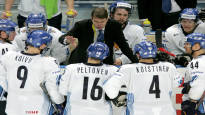Former A national team head coach Westerlund wants to take people’s ability to cooperate to the top. Heikki Hietanen has also announced that he is available for the position of chairman.
In recent years, worked on the board of the Turku Palloseura Erkka Westerlund is applying Harri Nummelan successor as president of the Finnish Ice Hockey Association (SJL).
The Ice Hockey Federation will elect a new chairman at the meeting of the federal council on November 25.
A member of the board of the International Ice Hockey Federation (IIHF) can be considered Westerlund’s fiercest competitor for the chairman’s plot Heikki from Hietawho confirmed to Urheilu on Monday that he is available for the job.
So there will be at least two hard puck names in the presidential race.
Urheilu caught up with Westerlund on Monday.
Erkka Westerlund, what made you want to participate in the ice hockey association’s presidential race?
– Such little concern for the future of hockey and its operating culture. In a way, (I am) sports’ alternative to this presidential race. In other words, in the past there were quite a lot of (chairmen) from the business world or politics. It is such a time in Finland that you should really be able to speak and work for sports management.
If you were elected president, what would you bring to the table?
– In addition to elite sports and success, sports and hockey in general should also be able to increase our social importance. Our nation is not doing well right now. People’s ability to function and well-being decreases. The most important thing is the development of people.
– There is a need for sports coaching in society as a whole, so that we can maintain a vibrant and healthy society.
– These two things can both be affected at the same time, so that our elite sport is successful and at the same time we can do socially influential and significant work.
Isn’t the chairman’s burden heavy: successes are not necessarily praised and the chairman often has to respond to grievances in the media?
– I see sport more as an opportunity. It’s certainly part of the mission, but this seems more like an opportunity. Namely through the fact that there is concern about the operating culture. Changing it doesn’t happen in an instant. By making the right choices all the time in the right direction, we can fix that too.
In light of the recent news, do you feel that the hockey people have lost their moral compass?
– They are isolated cases, but I can see that it does reflect the operating culture of hockey, which I myself would like to change. In general, meeting our people is appreciative. The whole hockey game is actually based on that, that we are able to cooperate and take people’s ability to cooperate to the very top.
– It is also partly related to what our world of values is like, and how we deal with people. The culture has changed and is changing, and it should be accelerated in the Ice Hockey Federation – a change in the operating culture.
How are you going to beat Heikki Hietanen in the presidential election?
– Heikki Hietanen is a good option and has done a lot of good work for Finnish ice hockey. I see that in this situation, this is more of a choice of line, what we want to focus more on in the future.
– I believe that Hietanen is more representative of the current operating model. I would like to bring some freshness to it and take the culture to a more people-oriented activity. We want to succeed internationally, and the second is this social influence and importance.
What kind of position do you think Finland has in international ice hockey at the moment?
– We still have a strong position. It has already started earlier, but yes Kalervo Kummola has really strengthened it a lot. Heikki Hietanen is currently on the board of the international association and Matti Nurminen is the CEO of the International Federation. We have pretty good settings there and let’s remember that Emma Terho is the chairman of the sports commission of the Olympic Committee and it’s a really tough wash where influence is done.
– I see the biggest thing in this international direction is that although we have now had a lot of success with the A national team (Olympic and World Cup victories), we haven’t really built a future in the background. We need to continue to develop our skills so that we can stay at the top in international hockey.
